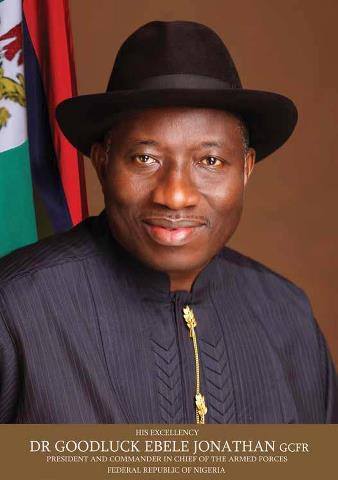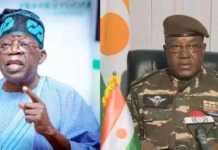 The recent public spat between former President Olusegun Obasanjo and President Goodluck Jonathan was timely and revealing for several reasons because not only did it expose the hypocrisy and often spoken about false ‘messianic’ posture of the Ota farmer, it also showed that indeed, the president does have a ‘body language’ which when communicated to the right recipient, makes things happen – things like allowing the relevant government agencies to perform their various constitutional responsibilities unhindered.
The recent public spat between former President Olusegun Obasanjo and President Goodluck Jonathan was timely and revealing for several reasons because not only did it expose the hypocrisy and often spoken about false ‘messianic’ posture of the Ota farmer, it also showed that indeed, the president does have a ‘body language’ which when communicated to the right recipient, makes things happen – things like allowing the relevant government agencies to perform their various constitutional responsibilities unhindered.
The first prominent attempt at drawing the attention of Nigerians to Mr. Jonathan’s body language was by the Speaker of the House of Representatives, Alhaji Aminu Tambuwal, who while presenting a paper titled the ‘role of the legislature in the fight against corruption in Nigeria’, at a one day roundtable to mark the international anti-corruption day organised by the Nigeria Bar Association, NBA, in Abuja earlier this month said: “Take the subsidy probe, the pension, the SEC probe and recently the bullet proof car cases. After the House of Representatives did a diligent job by probing and exposing the cases, you now see something else when it comes to prosecution… By the action of setting up different committees for straightforward cases, the president’s body language doesn’t tend to support the fight against corruption”.
Although the president’s spokesman, Reuben Abati stoutly rejected Tambuwal’s allegations, saying his principal’s body language has never constituted a stumbling block to the fight against corruption, recent happenings have proved that argument to be fatally flawed and evidence of a lack of proper understanding of what President Jonathan stands or does not stand for.
According to Wikipedia, “Body language refers to various forms of non-verbal communication, wherein a person may reveal clues as to some unspoken intention or feeling trough their physical behavior”.
In recent times, whether rightly or wrongly, Nigerians have faulted the Jonathan administration’s penchant for setting up committees for almost every national assignment that could have been performed by existing government agencies thereby leading to duplication of functions and rendering some statutory agencies jobless as their duties are performed, albeit temporarily by committees.
A case in example is the N255 million armored cars’ scandal mentioned by Tambuwal in his paper presentation and which was widely reported in the media.
The Minister of Aviation, Ms. Stella Oduah was accused of breaching the 2013 Appropriation Act by approving expenditure of over N643 million for the Nigerian Civil Aviation Authority, NCAA, to purchase 54 vehicles this year. More so, the cost of the BMW armored cars were allegedly over-inflated neither was contract for the purchase of the vehicles widely advertised as required by law.
But in a knee-jerk reaction to the widespread outrage that greeted the scandal, President Jonathan constituted a three-man panel to probe the minister’s culpability or otherwise in the scandal – the panel’s report has since been submitted and is probably gathering dust somewhere on the shelf designated for abandoned reports in the president’s office.
To many Nigerians, that was a misnomer. To those who hold this view, including this writer, what the president ought to have done was direct the Economic and Financial Crimes Commission, EFCC, to investigate the matter. This was an open and close case that did not require the setting up of any panel – and that was how a golden opportunity to prove that the present administration’s much touted war against corruption was not a mere rhetoric, was lost.
That would later be a clear indication of a ‘body language’ that did not want to fight corruption as you would later see. May I point out that while it is trite that every suspect is innocent until proven guilty by a competent court of law, food meant for the Lion should also not be served to the house cat for convenience purpose.
Now, fast-track from the period when the president set-up a committee to probe one of his purportedly favourite ministers and one of the leading lights in an otherwise lackluster cabinet until her recent ‘undoing’, to some few days ago when in his response to Mr. Obasanjo’s allegations contained in an open letter he wrote that the present administration was engaging in human rights violations and clandestinely training snipers to eliminate political opponents, he correctly and commendably directed the relevant security agencies and National Human Rights Commission, NHRC, to probe the weighty allegations.
Is this a case of different strokes for different folks; where one allegation deserves the setting up of a panel rather than allowing the relevant government agency to do its job and another is promptly referred to the relevant agency for action? Don’t get me wrong, Mr. Obasanjo’s allegations are too weighty to be ignored not to be investigated but so is a weighty allegation of abuse of office and corruption. After all, what is sauce for the goose should be sauce for the gander!
This brings me to the following conclusions and recommendations:
Firstly, the president surely has a body language – and Abati can deny all he wants – that tends to condone certain misdeeds perpetrated by his close allies/associates but descends heavily on his perceived enemies/political opponents. Governors Chibuike Amaechi of Rivers, Sule Lamido of Jigawa and recently Rabiu Kwankwaso of Kano are some of the living witnesses to this ‘unfriendly’ side of Mr. Jonathan.
Secondly, the president’s body language is unduly heating up the polity whether he knows it or not because tongues are wagging that he is unleashing the apparatus of state on only his perceived enemies.
Thirdly, the president’s body language is inconsistent and portrays him as a leader with no standard measurement of sense of judgment. The Stella Oduah and Olusegun Obasanjo case scenarios are testament to this fact or claim of mine; whichever suits you.
It is recommended that for Nigeria to get the war against corruption right and indeed every other aspect of governance right, relevant agencies should be allowed to do their job without waiting to be given a push by the president or governors or any other senior government official as the case may be.
While it is good for the president to have a ‘body language’, it should be discernable at all times not only when perceived opponents of the government are involved.
That the president should not stop at the commendable move he made by directing the relevant government agency to investigate some allegations made by Mr. Obasanjo but should make the empowering of relevant agencies to perform their core duties the cornerstone of his administration.
Ayodele Daniel is a Content Creator at Information Nigeria. Please follow him on Twitter @ayoadaniel




